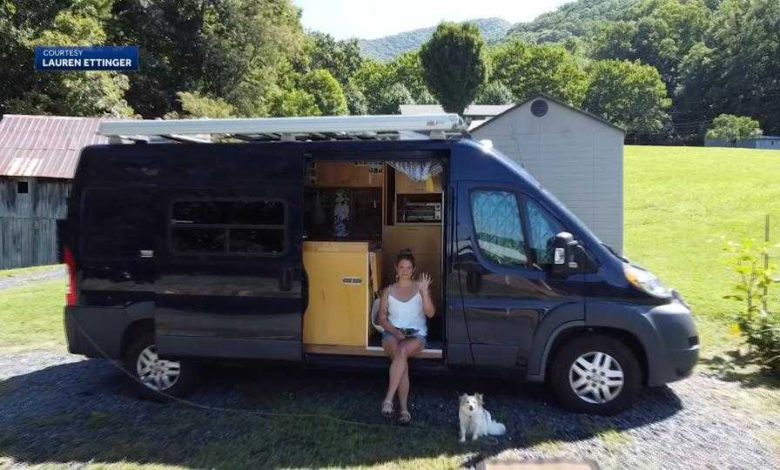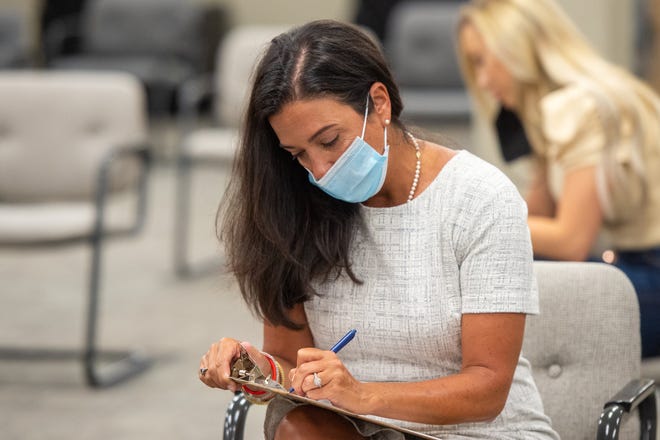

The switch to van life among many people has increased demand for a business that makes custom mobile homes.You may have heard about another pandemic side effect called the great resignation. Since April, the Bureau of Labor Statistics has reported record numbers of people leaving their jobs. As it turns out, many people are turning their new lifestyle into something a little more adventurous with the next trend — van life.Maryland-based OGAVans is the only one of its kind in the Mid-Atlantic where builders are busy crafting custom mobile homes. They squeeze cabinets, a kitchen, a bed and even a composting toilet into an average of about 86 square feet.Aaron Fensterheim, owner of OGAVans, said business has been on the fast track since 2017, thanks to what's aptly called van life."You get to live the lifestyle you want. You're not stuck in your 9-to-5, drive home, drive to work. ... You're really getting to live the life you want," Fensterheim said.It's a lifestyle popularized through media and accelerated by the COVID-19 pandemic. Movies and social media give a glimpse into a glamorized perspective of van life. An ideal formula for people cooped up at home, craving more opportunities during the pandemic."It's just giving people the opportunity to either visit family, spend time in nature, do what they really want to do, and I think that's the big key. It's a lot of opportunities for a large majority of the population that don't need to physically work somewhere or have the ability to not work," Fensterheim said.Fensterheim said most young clients still work remotely."Work was the thing that I did to pay the bills and, you know, that was it," Lauren Ettinger said.Ettinger, a van lifer and a client of OGAVans, said the desire to change her career and lifestyle came pre-pandemic about three years ago."I worked for a nonprofit State Department exchange program, so I had a very typical, very D.C. job, but made some transition in my life," Ettinger said.This brought a transition from her full-time desk job in Washington to part-time remote. After a year, she stepped away from that job, too. She is now working freelance in her Dodge Ram Promaster van — a big change for a tiny home."But you also worry about so much less than you do in the house. There's less push on making more money, buying more things. It's just a way to be more outdoors, happiness, minimalist lifestyle than living in a house," Ettinger said.Ettinger said she has noticed more van lifers on the road now, too. Demand for vans has also sped up. But costing up to more than $100,000 per build, van life is not cheap."There are just not vans available, and for many of my friends who have sold their vans and transitioned to other stuff, you basically list it and it's gone instantly, and that was not the case a few years ago," she said.That same demand, as well as supply chain issues, are now fueling OGAVan's backlog of orders — now up to 11 months of waiting for clients, driving business and new life changes through van life."People are going to continue to work remote," Fensterheim said. "We've never seen a slowdown. We've only seen a pick-up."
The switch to van life among many people has increased demand for a business that makes custom mobile homes.
You may have heard about another pandemic side effect called the great resignation. Since April, the Bureau of Labor Statistics has reported record numbers of people leaving their jobs.
As it turns out, many people are turning their new lifestyle into something a little more adventurous with the next trend — van life.
Maryland-based OGAVans is the only one of its kind in the Mid-Atlantic where builders are busy crafting custom mobile homes. They squeeze cabinets, a kitchen, a bed and even a composting toilet into an average of about 86 square feet.
Aaron Fensterheim, owner of OGAVans, said business has been on the fast track since 2017, thanks to what's aptly called van life.
"You get to live the lifestyle you want. You're not stuck in your 9-to-5, drive home, drive to work. ... You're really getting to live the life you want," Fensterheim said.
It's a lifestyle popularized through media and accelerated by the COVID-19 pandemic. Movies and social media give a glimpse into a glamorized perspective of van life. An ideal formula for people cooped up at home, craving more opportunities during the pandemic.
"It's just giving people the opportunity to either visit family, spend time in nature, do what they really want to do, and I think that's the big key. It's a lot of opportunities for a large majority of the population that don't need to physically work somewhere or have the ability to not work," Fensterheim said.
Fensterheim said most young clients still work remotely.
"Work was the thing that I did to pay the bills and, you know, that was it," Lauren Ettinger said.
Ettinger, a van lifer and a client of OGAVans, said the desire to change her career and lifestyle came pre-pandemic about three years ago.
"I worked for a nonprofit State Department exchange program, so I had a very typical, very D.C. job, but made some transition in my life," Ettinger said.
This brought a transition from her full-time desk job in Washington to part-time remote. After a year, she stepped away from that job, too. She is now working freelance in her Dodge Ram Promaster van — a big change for a tiny home.
"But you also worry about so much less than you do in the house. There's less push on making more money, buying more things. It's just a way to be more outdoors, happiness, minimalist lifestyle than living in a house," Ettinger said.
Ettinger said she has noticed more van lifers on the road now, too. Demand for vans has also sped up. But costing up to more than $100,000 per build, van life is not cheap.
"There are just not vans available, and for many of my friends who have sold their vans and transitioned to other stuff, you basically list it and it's gone instantly, and that was not the case a few years ago," she said.
That same demand, as well as supply chain issues, are now fueling OGAVan's backlog of orders — now up to 11 months of waiting for clients, driving business and new life changes through van life.
"People are going to continue to work remote," Fensterheim said. "We've never seen a slowdown. We've only seen a pick-up."
Source link









